Papers by Katharina Lima de Miranda
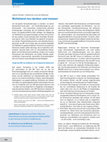
Wirtschaftsdienst
Addressing the major challenges Germany and the world face today – from mitigating climate change... more Addressing the major challenges Germany and the world face today – from mitigating climate change to the shortage of skilled labor – will require concerted, transformative political effort that builds on collective values and pursues societal goals. Economic growth should be achieved in a sustainable and inclusive manner and not at the expense of social cohesion or future generations. To do this, we need to rethink prosperity and find new ways to measure it. Productivity growth and material gains, measured in terms of gross domestic product (GDP), are important, but insufficient as central targets and yardsticks for social progress. The things that we actually value should be measured. This includes not only economic well-being and income distribution, but also other dimensions of well-being, such as social participation, societal cohesion, personal empowerment and opportunity, as well as environmental sustainability. In this article, we discuss Germany’s strategy for measuring and ...
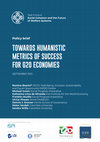
Kiel Policy Briefs, Sep 1, 2021
The COVID-19 pandemic has changed the relationship between the market economy, state and society ... more The COVID-19 pandemic has changed the relationship between the market economy, state and society in almost every country worldwide. While the economy paused and literally shut down in many countries during the first wave of the pandemic, the state and civil society have gained new significance in protecting people from the ravages of the coronavirus. This shift has affected the public's perception of the role of markets, government and society in response to the worldwide shock. In particular there is an increased recognition that societal well-being goes well beyond material prosperity and that society, governments and markets should contribute to enhancing human well-being in a sustainable fashion. The Italian G20 Presidency comes at a time when uncertainties concerning the evolution of the pandemic persist and its economic impact is expected to weigh heavily on economies and societies for many years. In addition, the global COVID-19 pandemic and climate crises have catapulted vulnerabilities that emerged from an equity chasm, leaving whole segments of the human population-people with disabilities, older people, displaced and refugee populations, women and children-particularly vulnerable to psychological, social and economic shocks. However, crises force re-evaluations, reconsiderations and reprioritisations to build forward better, on individual and collective levels, in institutions and among those that govern them, to promote equity, inclusion and well-being for all, leaving no one behind. Against this background, the Italian Presidency is committed to contributing to the development of a shared vision to shape a brighter future for all, and promises that "All policy actions will be centered on people". This makes it necessary to put fundamental human needs at the heart of policy making, in line with what the OECD (e.g.
Kiel Policy Briefs, Mar 1, 2012
Among measures to fight hospital acquired infections, an emerging epidemic in many countries arou... more Among measures to fight hospital acquired infections, an emerging epidemic in many countries around the world, adoption of appropriate hand hygiene practices by healthcare workers is considered a priority. Despite their simplicity and effectiveness, healthcare workers' compliance is poor, with most empirical studies finding compliance rates well below 50% in many countries. Management strategies to increase compliance are often based on the notion that non-compliance is a moral hazard problem, characterized by asymmetric information between hospital management and healthcare workers. In this study, we provide empirical evidence that an individual behavioral characteristic, known as overconfidence, induces many healthcare workers to overestimate their hand hygiene compliance and hence to underperform unknowingly and unintentionally [...].
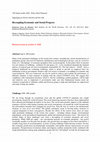
up to 100 words) Many of the prominent challenges of the twenty-first century, including the curr... more up to 100 words) Many of the prominent challenges of the twenty-first century, including the current dissatisfaction of population groups who feel left behind by globalization and technological advance, may be viewed in terms of a “decoupling” of economic prosperity from social prosperity. In this policy brief we present two new indexes of wellbeing solidarity (S) and agency (A) to be considered alongside the standard indexes of material gain (G) and environmental sustainability (E). The four indexes – SAGE form a balanced dashboard for evaluating wellbeing, which is meant to provide an empirical basis for mobilizing action in government, business and civil society to promote a recoupling of economic and social prosperity. This new framework can also be useful to analyze and evaluate the performance of different countries in their response in dealing with the current COVID19 crisis. We suggest that compliance with containment measures, which is vital for combatting a global pandemic...
The present paper contributes to the controversy regarding gender differences in risk taking by i... more The present paper contributes to the controversy regarding gender differences in risk taking by investigating the impact of social comparison. Social comparison is formalized by integrating a social reference point into the model of Koszegi and Rabin. Drawing on previous results from evolutionary biology, we hypothesize that men (women) focus more on relative (absolute) income, i.e., the relative weight of social gain-loss utility is higher for men than for women. Our model predicts that risk taking is higher for correlated than for uncorrelated risks and that this effect is stronger for men than for women. These predictions are confirmed by a simple classroom experiment. We conclude that social comparison and the correlation of risks play an important role in the discussion of gender differences in risk taking.
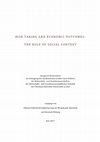
In my thesis I analyze risk taking and resulting economic outcomes in different settings with a p... more In my thesis I analyze risk taking and resulting economic outcomes in different settings with a particular focus on the social context. Thereby, I contribute to answering the question whether and how the social context influences preferences and thereby economic outcomes. My thesis consists of two parts. The first part, composed of two papers, addresses economic consequences in an environment where risk taking is inherent – the gambling market. Existing regulations are discussed from an economic perspective and possible new regulations are proposed. It, therefore, provides new insights and arguments on the debate on the optimal regulation of gambling, which directly affects economic outcomes. On the aggregate level it has implications in form of tax revenues and on the individual level for example in the context of problem gambling. The second part of my thesis is composed of three papers that address risk taking in experimental settings with a focus on the social context. In these ...
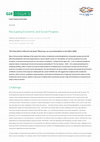
Many of the prominent challenges of the twenty-first century, including the current dissatisfacti... more Many of the prominent challenges of the twenty-first century, including the current dissatisfaction of population groups who feel left behind by globalization and technological advance, may be viewed in terms of a “decoupling” of economic prosperity from social prosperity. In this policy brief we present two new indexes of wellbeing – solidarity (S) and agency (A) – to be considered alongside the standard indexes of material gain (G) and environmental sustainability (E). The four indexes – SAGE – form a balanced dashboard for evaluating wellbeing, which is meant to provide an empirical basis for mobilizing action in government, business and civil society to promote a recoupling of economic and social prosperity. This new framework can also be useful to analyze and evaluate the performance of different countries in their response in dealing with the current COVID19 crisis. We suggest that compliance with containment measures, which is vital for combatting a global pandemic, will be h...
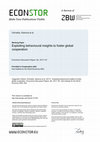
The authors identify three challenges to global cooperation and propose three solutions. The firs... more The authors identify three challenges to global cooperation and propose three solutions. The first is the lack of integration of civil society into global governance. In the spirit of Ostrom's poly-centric governance, they propose stronger interaction between public international authorities, including the G20, and civil society. The second is the reliance of economic policy on a model of human behaviour based on self-interest and instrumental rationality. The authors propose on the contrary to ground policies on behavioural evidence, and to increase cooperation between academic institutions active in this field worldwide. The third is the recognition that the spread of divisive narratives, which emphasize demarcations across national or religious lines, hinders global cooperation. Alternative narratives should be produced within a transformative process involving responsible leaders, decision-makers, experts, and civil society.
This study contributes to the public debate on gender quotas and the literature on gender and ris... more This study contributes to the public debate on gender quotas and the literature on gender and risk taking by analysing how the level of risk taking within a group is influenced by its gender composition. In particular we look at the shift of risk taking between group and individual decisions and analyse to which extent this shift depends on the gender composition. We derive a gender-specific polarization hypothesis which states that compared to individual preferences, male dominated groups will shift towards higher risk taking than female dominated ones. Our experimental tests reveal a systematic impact of gender composition on group shifts which supports our hypothesis and points into the direction that a higher share of females may prevent excessive risk taking.
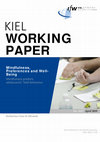
Mindfulness could influence economic and health related behaviour by bringing about increased and... more Mindfulness could influence economic and health related behaviour by bringing about increased and unbiased attention to the present moment, for example to a decision making process. This study explores the relationship between mindfulness and economic preferences, and consequently wellbeing, of adolescents. Comprehensive data of 525 German secondary school students were elicited and show no evidence for a strong linear or non-linear correlation between mindfulness and economic preferences. However, both mindfulness and preferences have explanatory power for adolescents’ field behaviour and thus contribute to explaining variation in behaviour that may translate into serious health and economic consequences. In this regard, my findings indicate that the two concepts play rather complementary than substitutable roles, which implies that an integration of economic preferences and personality traits such as mindfulness may improve the analysis of potential sources of variation in life ou...
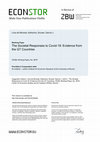
SSRN Electronic Journal, 2021
This paper provides a new picture of how countries have responded to the COVID-19 pandemic by exa... more This paper provides a new picture of how countries have responded to the COVID-19 pandemic by examining the effects of the pandemic in terms of normative foundations for societal wellbeing. Social prosperity depends primarily on the functioning of four domains: the economy, the state, civil society and the environment. We use the Recoupling Dashboardcomposed of four main indexes: Solidarity (S), Agency (A), GDP (material Gain, G) and Environmental sustainability (E)-to uncover the divergent experiences of countries in 2020. This paper focuses on the G7 countries-Canada, France, Germany, Italy, Japan, the United Kingdom, and the United States-as the first step towards a wider appraisal. In all countries under review we see a sharp drop in GDP due to the pandemic and a corresponding drop in CO2 emissions. The uniformity of response in the economic and environmental domains stands in sharp contrast to the diversity of social responses to the challenge of cooperation that the coronavirus posed. The only clear pattern that emerges from crosscountry comparisons is that Inward Solidarity, important for social cohesion in close social networks, and Outward Solidarity, important for the will to cooperate with other nations and cultures, have drifted apart in all G7 countries except Japan. Otherwise the movements in solidarity are highly idiosyncratic. In addition, the responses of Agency to the pandemic are diverse and are not noticeably correlated with the changes in Solidarity. The discrepancies in the social responses to the pandemic may be expected to have potentially important implications for how these countries fare during the pandemic and how well they come out of this crisis.
Journal of Economic Behavior & Organization, 2021
Zeitschrift für Wirtschaftspolitik, 2018
This study examines structural differences in the subjective quality of health care in Germany us... more This study examines structural differences in the subjective quality of health care in Germany using a newspaper survey. We find that there are significant differences between urban and rural areas as well as between public and private insurance. In rural areas, the provision of general practitioners, specialists and hospitals are considered as worse than in cities. In particular, public insured individuals asses the provision of specialized doctors and hospitals as lower than private insured and criticize long waiting times for appointments and lacking coverage of health care costs by the statutory health insurance.
SSRN Electronic Journal, 2018
Are economic preferences shaped by the family context? The impact of birth order and siblings' se... more Are economic preferences shaped by the family context? The impact of birth order and siblings' sex composition on economic preferences
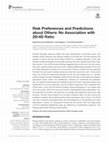
Frontiers in behavioral neuroscience, 2018
Prenatal androgen exposure affects the brain development of the fetus which may facilitate certai... more Prenatal androgen exposure affects the brain development of the fetus which may facilitate certain behaviors and decision patterns in the later life. The ratio between the lengths of second and the fourth fingers (2D:4D) is a negative biomarker of the ratio between prenatal androgen and estrogen exposure and men typically have lower ratios than women. In line with the typical findings suggesting that women are more risk averse than men, several studies have also shown negative relationships between 2D:4D and risk taking although the evidence is not conclusive. Previous studies have also reported that both men and women believe women are more risk averse than men. In the current study, we re-test the relationship between 2D:4D and risk preferences in a German student sample and also investigate whether the 2D:4D ratio is associated with people's perceptions about others' risk preferences. Following an incentivized risk elicitation task, we asked all participants their predict...
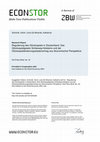
Zeitschrift für Wirtschaftspolitik, 2013
This paper compares the two laws effective for the regulation of gambling in Germany from an econ... more This paper compares the two laws effective for the regulation of gambling in Germany from an economic perspective. On the one hand there is the new and relatively liberal federal Gaming Amendment Act of Schleswig- Holstein (GAA) and on the other hand the German State Treaty on Gambling (GST), which was signed by the remaining 15 German federal states. First, two goals are derived that should be pursued by the regulation of gambling realization of tax revenues and the reduction of problem gambling. Channeling gambling into the regulated market is a necessary condition to achieve both objectives. As the GAA can be expected to realize a higher degree of channeling due to more competitive tax rates as well as the inclusion of online poker and casinos, it appears to be overall superior to the GST. It is in particular incomprehensible that online poker and casinos are not included in the GST, since on one side they have a high potential for addiction and should thus be regulated and on th...
Journal of Risk and Uncertainty, 2014
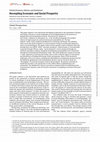
Global Perspectives, 2020
This paper explores a new theoretical and empirical approach to the assessment of human well-bein... more This paper explores a new theoretical and empirical approach to the assessment of human well-being, relevant to current challenges of social fragmentation in the presence of globalization and technological advance. We present two indexes of well-being—solidarity (S) and agency (A)—to be considered alongside the standard indexes of material gain (G) and environmental sustainability (E). The four indexes—SAGE—form a balanced dashboard for evaluating well-being. The solidarity index covers the needs of humans as social creatures, living in societies that generate a sense of social belonging. The agency index involves people’s need to influence their fate through their own efforts. While “economic prosperity” (material gain) is conventionally measured through GDP per capita, “social prosperity” can be measured through our solidarity and agency indexes, alongside environmental sustainability that is measured through the Environmental Performance Index. The SAGE dashboard is meant to prov...







Uploads
Papers by Katharina Lima de Miranda